I’m sitting in Chuck’s Hop Shop on Seattle’s East Union St. The huge variety of bottled beers lining the walls is overwhelming. I don’t drink, but I’m fascinated by the colors of the labels. The evening is warm and the doors of the bar are open. It appears Chuck’s Hop Shop used to be a large garage of some sort. Did this place used to be a garage I ask myself? I get a Coke from a vending machine. I’m expecting to meet Al Milman and Moshe Weinberg. They’re the former proprietors of Bedazzled Discs. They stuck it out through the 90s while the record business was crumbling around them up to the point that digital downloads were on the brink of overtaking every other form of music. Their store was geared toward imports, garage and pop classics and a bit of the more esoteric music that collectors are always seeking out. In the end the survived into the 21st century. Despite an uphill battle they made it from 1991 ‘til 2003.
I’ve never met Moshe, but I know Al a bit. Al went out of his way to make sure we scheduled this meeting at a time Moshe was available. It seems he’s a very busy guy. Al is a man obsessed by music. He’s been that way since he was a kid growing up in New York City. Along the way he’s managed to rub a lot of shoulders with punk, garage, psychedelic and jazz artists…hell…all kinds of artists. I also know he and his band The Alan Milman Sect were there at the beginning of the downtown punk explosion in the NYC during the 1970s. His music and/or Bedazzled Discs have been covered in magazines from Trouser Press to the NME and the BBC’s music sites to Billboard. His music also the subject of a multitude of bloggers who are interested in anything punk…or anything off-beat.. The website Killed By Death once wrote ‘Hell, not even Poison Idea does it as good as Alan Milman Sect’. His song ‘Stitches in My Head’ was covered by Urge Overkill. He has a visible presence on facebook, and he’s not afraid to tell anyone what he thinks online or in person.
Al’s recorded with his own band, The Alan Milman Sect, and managed and produced The Boss Martians. He’s DJ’d at Rodney Bingenheimer’s English Disco in Los Angeles and graced the stage of CBGB’s in New York. Eventually he’d find his way to Seattle and co-own one of the cities’ first stores to cater to those taking part in the record renaissance from the early 90’s and beyond.
Al arrives and we chit chat while we wait for Moshe to arrive. Al and I are a bit early. Moshe arrives on schedule as planned. He appears much younger than I’d expected…but it must be attributed to good genes. I know he’s not as young as he looks. After I get the recorder set up and Moshe grabs a falafel from the food truck outside it’s time to begin.
I hate doing interviews. I sound so vapid, and there’s only a limited supply of stupid questions to ask, I’m gonna leave this one to the two of them, I think to myself.
“So what was the genesis of your store?” I blurt out. Oh god…that sounds ridiculous.
“Al and I met in New York” says Moshe. We have a couple of common friends. I’d heard about Al but I think I met him about 1985 or 1986 for the first time. I was going to college and Al was good friends with my best friend and roommate Danny Israel who lives here in Seattle. I think it was either Danny Israel, Gary Schrank, or Vinny Hayes; I’m not sure which one. Anyhow, we went to a couple of shows…I think The Lyres (from Boston) a couple of times, but we weren’t close friends at that point. Later in the 80s I got to know Al better. I was going to college. I would spend time making tape collections of other people’s record and CD collections. Al had a really cool record and CD collection he was just starting. I thought it was great that he introduced people to a lot of stuff. I was mostly aware of it-he thinks I wasn’t- but anyway I would go to his apartment and record a lot of his CDs and records and I think at the end of my time in New York we just ran into each other at random concerts”. Al later tells me ‘We saw The Fleshtones and Chesterfield Kings (also from Boston) a lot”
“I mentioned I was moving back to Seattle and that I used to work for a record store”. Moshe continues. “Al’s response was “You’re never going to make money at record store, you have to own one.” It was an off-hand comment…I think maybe he asked me what I was going to do in Seattle. I don’t recall exactly why I said it, but for some reason I mentioned that when I got back to Seattle I’d like to work at a record store again. Once again he threw out the idea that if you really want to make money you have to own a record store as opposed to working in one. Now I know better. You don’t make money either way but I guess that was the start of “well, let’s look into that” and we decided to pursue it”.
“I moved back to Seattle. Al was still in New York. I started looking for a storefront property in different neighborhoods. Then he came out to visit. I think it was around Thanksgiving weekend of 1990. There was a big storm that week and Al got to know Seattle. I took him around to a few neighborhoods and eventually we found this little spot in Pioneer Square and we went for it. It was at 101 Cherry Street. It’s a barber shop now. So Al moved to Seattle”.
I was living in what was my grandmothers house. She had recently been moved to an old age home so the house was vacant. In fact there was someone else living there part time. Al came to town and stayed at my grandmother’s house for a month or two before he found a job. We started planning opening the store. The grand opening was June 5, 1991. I think initially our focus was import CDs. Stuff that was not out in the US; mostly ‘60s or Garage or things like The Yardbirds. We didn’t have much vinyl at that point, so later we had to build up our record collection”.
“John Keister was at our opening by the way”. Al points out.
Keister was probably at the height of his celebrity at the time. His local sketch show ‘Almost Live’ was airing each Saturday night locally, and had been syndicated nationally. He’s remained on the Seattle comedy and cultural scene for years…as close as Seattle gets to conferring ‘icon‘ status. Finally, last year Jon performed what he claimed would be his last stand-up comedy schtick at Seattle’s Benaroya Hall. The show was called “Living and Dying in Seattle” It both lamented and celebrated Seattle’s one-time dowdy and beloved small-town atmosphere into becoming a major American city full of high-tech transplants, bursting with high rise buildings and a much more business-like approach. His show was held on September 9, 2017. At the time Keister said “It’s a brand new city out there. Natives, Newcomers and anyone else trying to make sense of this town are welcome. Let’s have a party!”
Since then John has now settled into a life of writing and teaching script-writing at the Art Institute of Seattle. But he says he’ll perform at corporate events and ‘wave from convertibles at whatever parades that will have me”’.
“Do you remember the SoundWaves store in Burien?” Al asks.
I have to admit I’m not familiar with the place because I’ve been to Burien fewer times than I have unbroken fingers on my right hand. That would make it twice.
“I wouldn’t say they were the prototype” Al says “but they were one of the influences of ours. Stores in New York like Bleeker Bob’s and those sort of stores”
Now, Bleecker Bob’s is a place I’m quite familiar with. The online journal Dangerous Minds once called it ‘The most loved and most hated record store in New York City.’ I fall into the former category. Over the years it was the nexus for oldies fans, proto-punks, punk rockers, psychedelic fans, garage and import enthusiasts, classic rockers, ‘60s folkies and post-punk affecianados. You name it. Anything and every kind of music seemed to be available, and it became a great place to mix and hang out. Some folks would even trek to New York City just to visit this mecca of music. Conversely “Bleecker Bob” would make trips elsewhere to find new and used stock to fill the store. In the 1970’s he went to London regularly, buying crates and crates of British punk rock that wouldn’t otherwise have been available in any American record store.
I used to pass by Bleecker Bob’s about two times a week looking covetously into it’s windows because buying records was a luxury for me back in my NYC days. I’d go in the store from time to time simply to browse the racks. But it was hard enough to pay the rent and have extra money to get drunk on. For a couple of years I had to curtail my obsession with obscure and/or import 7″ singles.
The “Bob” in “Bleecker Bob’s” was Robert Plotnik who ran the store in it’s several iterations in New York’s Greenwich Village for almost 50 years. Plotnik was a former lawyer who worked with the New York District Attorney. In 1967 Robert Plotnik teamed up with Al Trommers, a Doo-wop enthusiast who referred to himself as “Broadway Al.” The two opened a store originally called Village Oldies at 149 Bleecker Street. Because of the store’s location “Broadway Al” suggested Plotnik should take on the name “Bleecker Bob” It stuck. The location would change twice over the decades, eventually ending up at 118 West 3rd Street in 1981.
By this time Trommers had split from Plotnik. Trommers says his reason for leaving the partnership was due to Plotnik’s abrasive character. Plotnik was often cranky and notoriously abrupt with his customers whether they were kids from the Village (East or West) or one of the many celebrity musicians who frequented his store. He had a sharp tongue and did not suffer fools-many of which were potential customers. A 1993 episode of Seinfeld called ‘The Old Man’, features a character obviously based on Bleecker Bob, and part of the episode was actually shot in the store.
In 2012 Hazel Sheffield and Emily Judem’s documentary on Bob and the store For The Records. a conversation is captured between Bob and his girlfriend.
She asks him how they can keep the store operational when people weren’t buying records like they used to.
“They’ll buy them if I tell them to buy them,” Bob said.
Behind his temperamental facade Plotnik was well-versed in just about any pop music genre you could throw at him. and when he wasn’t showing his expertise, he was often curt and abrupt. Overall Bleeker Bob’s was a messy playground for music collectors, music stars, and off-the-steet music fans alike. Bob was at the center of it all. And as is true with all curmudgeons, there was kind heart at the center of his character.
In the mid-80s Plotnik opened “Bleecker Bob’s Golden Oldies Record Shop” at 7454 Melrose Avenue in Los Angeles. Shortly after the L.A. store’s opening Plotnik suffered a brain aneurysm. He’s now semi-paralyzed and lives in a nursing home on the Upper West Side. Chris Weidner took over the day-to-day operations of the New York store and the Los Angeles store didn’t last long. Weidner was almost as curt and temperamental as Plotnik, but he kept the store open until rising New York rents forced Bleecker Bob’s to throw in the towel. The storefront stayed vacant for a few months, then became the location of a national chain of frozen yogurt stores, Yogo. It went on to have several other tenants, and today the space is the site of the Miyabi Sushi Bar.
It and much of the rest of old rock, jazz, folk.punk and the other trappings of the vibrant Village scene are gone, and not for the better. The East and West Villages are now practically as touristy as Times Square and most artists and mucisians have been forced out of the neighborhood because of market prices.
It’s almost apparent that Milman takes on some of the characteristics of Bob Plotnik. His entire approach to selling records seems similar. Dismissive when asked questions he finds stupid; invested in helping others with recommendations and spinning tales about just about everyone he’s met in the music business or talking about fantastic bands and artists as well as rarities and obscure recordings. When a customer is a serious collector or knowledgeable or an honestly interested in exploring new music, he loves talking music with those who listen.
Returning to Al and Moshe’s story;
Al tells me “SoundWaves was the the closest store like Bleecker Bob’s and other New York record stores near Seattle, and they were stocking import CDs. They had a lot of Japanese imports, but they were out in Burien so we felt that Seattle could use a store like that, with maybe even a wider selection”
Moshe says “We opened our store and it was kind of a shoestring budget”I had to get my dad to co-sign a loan from the bank and Al borrowed money from his dad. There wasn’t a lot of money. We were really restricted so that’s how we started.”
“But we didn’t carry Genesis.” Al says.
Now Al is ribbing me about my first dumb question. Nothing gets by this guy.
He says “We would have if it was with Peter Gabriel, but by then it was Phil Collins. We would laugh at people like Phil Collins because that was sort of the antithesis of what we are doing, Moshe would laugh if somebody asked for “I Just Called To Say I Love You” by Stevie Wonder, and I would laugh at almost anything. Laugh at them or tell them “Get the hell out of my store!”
“Get the hell out of my store!” would be a response to asking for some horrible commercial thing.
They both laugh.
“Gillian Gaar (author of She’s a Rebel and former writer and associate editor at The Rocket) was our first customer.” Al tells me. “She bought The Chiffons”
“….and I think Little Richard too” adds Moshe.
I ask Moshe who he thinks their average customer was at the time they opened Bedazzled Discs in downtown Seattle.
“I would say the customers were those who wanted to pay $25 for a Japanese CD that was not out in the US.” he answers.
“What was the name of the guy who came and ordered a lot of Zappa stuff?” Asks Al “He was a short guy, really friendly. He was a very big customer. Our customers like that were completists. This guy wanted to order every Zappa CD he could get”.
“I’ve seen him recently, I mean in the last few years. But people like that, who were rabid collectors, they would be repeat customers, There were friends of ours like Shaun Lee or David Hersh, or guys that came in and bought the new “whatever” album, The new Ween album, the new Oasis album or whatever.”
“Were you selling mostly imports?” I ask
“We started transitioning pretty early” says Moshe. “I would say we started off concentrating mostly on imports from Japan and England. Then I think we realized we were missing out on the Sub Pop thing or whatever you want to call alternative; the people who wanted to buy The Smashing Pumpkins. Then there was K Records and C/Z and Estrus and all the other local bands and labels. Then we came in contact with the two owners of Sub Pop” (Jon Poneman and Bruce Pavitt)
“I still see Bruce Pavitt on the Hill. I still run into him at the grocery store” Al tells me. “I’ve known him forever and he’s a great guy and probably doesn’t live here anymore, but when they signed Nirvana they took us in the back of our store and told us the whole deal-how it happened which was very very interesting, How many record stores got that directly from the horse’s mouth?
I tell them I also know Jon and Bruce and that Bruce still comes to Seattle, but spends most of his time at the home and property he bought on Orcas Island several years ago. I’m not a
bsolutely sure if that’s still true because the fact is I haven’t seen Bruce in many years.
In 1984 Bruce Pavitt worked at store called Bombshelter Records, tucked away on the mezzanine of a small group of shops along Broadway Avenue in Seattle. Russ Battaglia was working there at the same time. Bruce and Russ decided to form a partnership and go into the record retail business on their own. The intention was to present as many bands on indie labels from around the country and overseas as possible. They were also committed to selling local artists and serving skate culture. They named the store Fallout Records and the long-running store was opened in July of 1984. It was in a tiny space at 1506 E. Olive Way on Seattle’s lower Capitol Hill and remained there until 2003.
Russ Battaglia amicably split with Bruce about 18 months after the store opened. Bruce left to pursue different aspects of his Sub Pop brand which included a fanzine, a regular monthly column in The Rocket magazine and his new start-up label Sub Pop. Russ brought his wife Janet on board to help him run the store. They introduced comics and the “illustrated novels’ that were beginning to become popular at the time. It was an important place for both the punk and the skate scene for years. Fallout actively supported and sponsored their own travelling skate team and put on local skate competitions. although Russ and Janet culled their skateboard business along the way. In 1987 Russ and Janet, along with Larry Reid started their own indie label, Black Label Records. They went on to release records by The U-Men, Gashuffer, The Hell Cows from Portland, Christ on a Crutch and a video of Big Black’s penultimate show at the Georgetown Steamplant on August 7, 1987. Black Label later went dormant and Russ and Janet closed Fallout in 1999. Tim Hayes, who’d been a friend and former employee of the Battaglia’s thought he could revive the business. Since leaving Fallout for a few years Tim had worked at Seattle’s Fantagraphics Books. In 1999 he set out to put Fallout back in business. Russ and Janet gave him their blessing, saying
“We worked really hard to provide an antidote to mall culture. Tim intends to do the same, so we say ‘help him keep our community!’
At the time Tim Hayes told Cynthia Rose of The Seattle Times;
“There will be a lot more of everything. More CDs, more records and additional musical genres. I especially want to help support the local jazz scene. I love jazz, and I know the Seattle scene is really swinging right now.”
Tim did indeed expand the store and was able to keep it afloat until February of 2003. Digital music was killing record and CD stores across the country.
My discussion with Al and Moshe then turns to the 20th anniversary showing of Robert Pray’s film Hype! The documentary covers the early ‘90s Seattle music scene.
“All the people we know are in Hype! “It’s the best local movie” Al declares. “Hype! nailed it, you know. Jack Endino. Megan Jasper making fun of ‘grunge‘ it’s wonderful”.
This is a statement not even worthy of debate. Hype! IS a fantastic snapshot of an era. It is without a doubt the best documentary of any moment in Seattle’s music history.
The 20th anniversary showing was September 25, 2017 at the Egyptian Theater, usually a Seattle International Film Festival venue (SIFF). The Hype! showing was sponsored by the Northwest Film Forum (NWFF) Their own space would have been far too small.
The anniversary screening included a panel discussion featuring Seattle music luminaries like Lulu Gargiulo and Kurt Bloch of The Fastbacks, Producer Jack Endino, Mark Arm of Mudhoney, Green River and Mr. Epp. A proto-grunge spoof band The Schmitheads (a spin-off of legendary ‘80s bands, The Thrown Ups and Mr. Epp) did a pre-screening set. The Schmidtheads featured Leighton Beezer, Ed Fotheringham, Scott Schickler and Jo Smitty, who co-founded the band Mr. Epp with Mark Arm. The term ‘grunge’ famously stems from a self-deprecating, joke letter written by Mark Arm to Desperate Times magazine in 1981. The panel was led by former KNDD music director Marco Collins. Marco was an advocate for local Seattle music after arriving from San Diego and a stint as an intern and DJ at the Mexican-owned, influential XTRA-FM (91X). The station had so much power that it could often be heard over large areas of Northern Mexico and the American southwest. It was also the inspiration for Wall of Voodoo’s ‘Mexican Radio’.
Back in Seattle KNDD (also known as 107.7, The End) was reluctant to play anything even remotely alternative unless it had already made a national splash (in other words Pearl Jam, Nirvana. Soundgarden. et al.) The station seemed indifferent to local music. In spite of this Collins was able to help many now well-known indie artists like Beck and Garbage, and spun records by Death Cab For Cutie, The Presidents of the United States of America, Foo Fighters, Harvey Danger and Sunny Day Real Estate on his all-local Sunday night show ‘The Young and The Restless’
Marco left KNDD IN 1998 but still spends time in Seattle. In 2015 Collins, who is openly gay, was the subject of the documentary ‘The Glamour and The Squalor’, directed by Marq Evans…and yes, the spelling’s right. The film follows his early life and on to his wild success in radio even while dealing with addiction, and his eventual sobriety. Mike McCready (of Pearl Jam) supplied the score for the the film. It won the Audience Award for Best Documentary at Outfest in Los Angeles, Audience Favorite at The Seattle Lesbian and Gay Film Festival, Best Documentary at the Sidewalk Film Festival in Birmingham, Alabama, Best Local Feature at The Tacoma Film Festival and it was the runner-up for Best Documentary at the Seattle International Film Festival. ‘The Glamour and the Squalor’ has also garnered nominations and awards from both LGBT and mainstream festivals world-wide. Next to Hype! it may be the second best film based on a musical figure and movement out of Seattle.
Back to Moshe. He tells me that while the store in Pioneer Square was getting off the ground he was listening to a lot of things Al was listening to…and many other things that Al didn’t listen to like The Jerky Boys.
For the uninitiated, The Jerky Boys were a juvenile and stoopid comedy outfit from Queens, New York. In other words they were hysterically funny. Especially when stoned. Johnny Brennan and Kamal Ahmed were childhood friends. In 1989 the pair created a cast of fictitious characters that would make prank calls, record them and release them as tapes. Their work was somewhat in the vein of Cookie Puss, the first indie 12” by The Beastie Boys but without the beats. The Jerky Boys were much, much more over-the-top in portraying a bevvy of voice characters. Their tapes found their way to New York DJ and radio host Howard Stern. His playing them on the air broke the Jerky Boys who went on to have phenomenal success. Despite their success Kamal left Brennan and The Jerky Boys after a dispute. Brennan continued producing Jerky Boys material on a solo basis. Kamal released his own solo album, Once a Jerk, Always a Jerk, in 2000 and in 2001 Brennan put out The Jerky Tapes. It was the last album by Brennan. He set The Jerky Boys aside after it’s release
Aside from The Jerky Boys Moshe says;
“I was listening to a lot of 60s Garage, a lot of great punk, and after the store opened I got more into a lot of the indie rock thing. I learned a lot more about it. As we started carrying more and more labels we’d get promos and I could check out more stuff and expand more.”
“The core of our business” says Al “was like Matador and Touch and Go and all the related labels We would try to figure out the new releases but also try to figure out which catalog releases we should have. We got some help sometimes. We’d have younger customers help us order stuff, to be perfectly frank, because we weren’t really experts on that
Billboard magazine says they were also getting new product through indie distributors like Abbey Road, run by Sam Ginsburg in Los Angeles, and Dutch East India Trading who was carrying Homestead Records, Giant Records, Grass Records and Rockville Records at the time.
I’m an expert on many different kinds of music but certainly not independent music. I mean, I’ve learned about it. Most people really delve into it pretty heavily. I had some interest in it if I liked the band. I like Sonic Youth and I like Ween, but that doesn’t mean I like 100 other indie bands, I would gravitate toward things that I really liked, but that didn’t necessarily kill our inventory or what our selection had to be. Moshe made a lot of suggestions because he was listening to it much more closely than I was, I think”.
“Wouldn’t you say that was true?” he asks Moshe.
“Some bands, yeah, And some bigger names” Moshe replies.
“You know we were working with with majors too-like Sony” Al tells me. “We also worked with Universal. They were going through different periods and there was stuff we would promote very heavily. I worked very heavily with those companies. Capitol was a very strange case because there was a woman-I’m not going to even say who she was-but she was a very uncooperative promotional woman who was going out with somebody very well-known in Seattle. She made a point not to be cooperative with our store so I contacted Donna Ross from Capitol Records in Hollywood (Ross was then national director of alternative sales at) and from then on we got the best service directly from Capitol in Hollywood because the original promo woman was not cooperative.”
“And then there was ‘Grand Royal’ (a vanity label set up by the Beastie Boys after they left Def Jam Records), They had this magazine and these guys were super into ‘The Beastie Boys’. I ran into ‘The Beastie Boys’ subsequently. I still listen to them-especially ‘Paul’s Boutique’ which is one of my favorite albums, But these guys would listen to The Jerky Boys and ‘The Beastie Boys’ night and day, So did Moshe and his brother Mordy. It was unbelievable. We even hung out with The Beastie Boys once”.
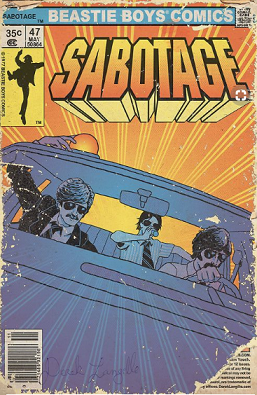 Moshe tells the story. “Actually what happened was, I think it was Grand Royal that got us into ‘Lollapalooza’ but they forgot to put our names on the guest list. Al talked our way in…Mordy and Al combined…and we went backstage and Al didn’t recognize any of them. Al went up to Mike D. and asked him where the food was. I said, ‘Do you realize he’s going on in half an hour or 45 minutes? He’s one of the Beastie Boys! You just asked one of the Beastie Boys where the food was!’
Moshe tells the story. “Actually what happened was, I think it was Grand Royal that got us into ‘Lollapalooza’ but they forgot to put our names on the guest list. Al talked our way in…Mordy and Al combined…and we went backstage and Al didn’t recognize any of them. Al went up to Mike D. and asked him where the food was. I said, ‘Do you realize he’s going on in half an hour or 45 minutes? He’s one of the Beastie Boys! You just asked one of the Beastie Boys where the food was!’
They both break into laughter.
Later Al tells me about smoking pot with them and having a generally bust-up time.
Al admits “I didn’t know what they looked like. When Urge Overkill came here-Urge Overkill recorded one of my songs called ‘Stitches In My Head’ (It was shortened to ‘Stitches’ on the band’s EP, ‘Stull’). Eddie Vedder was in the middle of the room when we went back to the motel. All these girls were clustered around this really diminutive guy. I didn’t know what Eddie Vedder looked like because Pearl Jam didn’t put their pictures on album covers. So I just asked Nash Kato from Urge Overkill ‘Who’s that diminutive guy attracting all the chicks in the middle of the room? He said ‘That’s Eddie Vedder’…I didn’t know….and I’m from Seattle….but he’s not really from Seattle-he’s from California- so I don’t really feel that bad about not recognizing him”.
“We were at 101 Cherry from 1991 through June of 1996 and then we moved to Capitol Hill” Moshe tells me. “Actually we made two moves. To Capitol Hill in 1996 and another move to the University District in 1998. On Capitol Hill we were next to The Oddfellows Hall. There wasn’t all that stuff that’s there is now, but the Molly Moon store was right by there. I think there’s an ‘H&R Block’ there now. Our store was in the Oddfellows Hall building on the ground floor. There’s several stores there The address is 911 East Pine which was odd because it was like 9-11, Kind of spooky.
“I think people who live in Seattle, even people who live in the neighborhood always mix up Pike and Pine Streets” says Al. “I do myself-except when our store was there. Obviously I knew which one I was on because we were on Pine, but now it’s: “Pine?…Pike?…whatever…” Al goes on to say “The Pine store was a lot larger than the Pioneer Square store, but a little too large. It was HUGE.
Moshe agrees. “Yeah it was much too large. Because there was more space the rent was higher. It was larger than we needed so it was a little bit of an uphill battle for us. That place only lasted a couple of years, but it had a good stage if we wanted to have in-stores and bands play there. We had The Wailers play but the space itself just wasn’t great, In the other two locations the customers came in, and they could talk to you right away, so the interaction was better; but the Capitol Hill store was harder because we were all the way in the back there. The interaction wasn’t great, plus theft was easier because you’re not going to run all the way across the store to catch somebody stealing CDs. The move never really justified itself in sales. Now we did carry a lot of great records there and that’s when our record thing really started to expand, so it was good for that, But we decided to move.”
“We decided that the University District was gonna be the best and probably only reasonable location to move to” Moshe says. “We talked about…it was a different time frame..we talked about the Pike Place Market and all these other locations.. We did find a place in the University District. We moved there in 1998. The first two locations had put us in a bit of a situation…I would say, without getting into too many specifics about the finances, where it was a make or break thing. We could have easily closed up the shops at either earlier locations because we had debts and all this stuff, but we were both kind of stubborn and decided we wanted to keep this going. You know, find the best way with how to deal with it.
In a 1998 article Billboard magazinefocused on Bedazzled Discs, and it’s impending move from 911 East Pine. They wrote;
“With more than 5,000 titles the mix of the Capitol Hill store was approximately 50% CD and 50% vinyl. The music runs the gamut with modern jazz, Jamaican, reggae, ska, psychedelic, garage, grunge, surf, rockabilly, hip-hop, soul, funk, comedy, vintage country and vintage rock and roll. The store also carries a large number of indie releases, including the entire catalogs of K Records in Olympia, Trojan Records from Jamaica on LP and CD (Trojan is British, actually) and Blue Note Records on LP and CD.
‘We try to carry real roots music’ Milman says. ‘Anything with a lot of energy and passion. The move to our new location in the University District, although slightly smaller with about 1,200 square feet gives us the opportunity to showcase more inventory with a much better lay-out”.
Al says “At one point Moshe tried to buy me out but he didn’t have any money” I can’t tell if this is tongue-in-cheek or not.
“But you know, I was a pain” Moshe says “because Al did have a lot of knowledge of records so we looked for spaces that were ideal locations…in-between the pursuit of chasing the right size. We needed something bigger than the store in Pioneer Square but smaller than Capitol Hill location. We didn’t need the extra space and as far as space goes the University District store was perfect, plus the bathroom was another good selling point”
“A good place for people to shoot-up in!” Al says in mock joy.
“We couldn’t fit so many records in the Pioneer Square store” Says Moshe. “We could on Capitol Hill, but as I said the customer interaction was really awkward there. So the U-District was good, and we moved there in 1998. Business did actually improve for awhile. quite a bit. The store was on University and 43rd Street, across from Rudy’s Barber Shop. We were at 4742 University Way, also across the street from the 7-11. So we were in the U-District, and it took a couple of years for Al to alienate the customers”.
“I did pretty well with alienating customers” says Al.
“So the location was great’ Moshe tells me. ‘The size was good, the layout of the records was really good and we were big enough that we could have in-stores. There was a bit of an issue with theft, like there was in the other two locations.
“It was generally bad in that neighborhood” says Al. “But both of us were very good at catching shoplifters. Mostly because I was a very good shoplifter when I was younger, so I knew what they were doing. I use to steal from our shoplifters, I was picking their pockets while they were stealing our CDs. Seriously, we’re both very good at stopping the attrition rate from shoplifting. We would catch people and we only had to have one guy arrested because he stole the whole Johnny Thunders and Iggy Pop sections. I won’t say his name even though I can because he was convicted-but I won’t. This guy shoplifted at every record store in Seattle that had something he wanted. He was a bad shoplifter, though, and we had to press charges”.
“At the third store in the University District-that’s when we were selling the entire Trojan record label”. Al tells me. “We had every record that was in print on Trojan at the time and that was a large part of our business, Also we bought Adam Bratman’s Sub Pop collection, which was another big part of that location. It greatly expanded our market for records”.
Seattle music fans obviously know the Sub Pop label but fewer people are familiar with Trojan Records.
Trojan was originally set up in 1968 by music retailer Lee Gopthal and ‘Island Records’ founder Chris Blackwell in London. Trojan’s initial output consisted of 7”Jamaican singles released in Britain by artists like Jimmy Cliff, Dave and Ansel Collins, Lee “Scratch”Perry, Desmond Dekker, Toots and The Maytals and many more artists we now consider classic Jamaican stars. In 1972 Chris Blackwell decided to give up his interest in Trojan and by 1975, without Island Records’ resources and overspending Trojan went broke. At the time they had been trying to re-mix, provide new arrangements and re-master former Reggae recordings for a wider British market. The assets that remained were bought up by Marcel Rodd and his label ‘Saga Records’. Rodd didn’t have a particular interest in the music of Jamaica, but the company wasn’t an expensive buy and Saga dealt in discounted records. At the time no one knew the Trojan catalog would become a cash cow. There were some thin times financially under Rodd, but Trojan was a source for the many British Skinheads who listened to and danced to the music of Jamaica. It was also a source for former Carribeans to find and enjoy the music they’d left behind. Still, this wasn’t a large market. Trojan ultimately succeeded on the strength of the “Ska Revival” of the late 70s and early ‘80s, sparked on by bands like The Specials, The Selecter and Madness. Rodd and his Saga Records then sold Trojan believing that the ‘Ska Revival’ was a fad that would soon implode. It was later sold to a rabid fan of Jamaican music, Colin Newman (not that Colin Newman) He would be the first of a few that would know how to exploit the label and bring it back to it’s then-fabled history. Newman also knew more than anyone how valuable the Trojan back catalog would become.
https://youtu.be/gEQdklk3LvE
One very smart move Trojan had made from the start was gathering up licensing deals for many lesser-known artists and with many smaller labels. They often released these artists locally on their smaller licensed labels to the Jamaican market rather than internationally. Their catalog included ‘reggae’, ‘rude boy’, ‘ska’ and ‘rock steady’ artists. A lot of these were deep tracks that would later become essential. Suddenly Trojan became the label to find these artists on as re-releases, and their original pressings became highly prized by collectors. In 1998 Trojan started compiling that would be a series of 69 boxed sets (so far) each made up of 50 tracks on 3 CD’s. They’ve also put out three similar box sets that are only available in Japan or as Japanese imports. Since 2000 the label has changed hands several times, but has made millions of dollars (or more?) off it’s extensive back-catalogue. Trojan remains one of the most profitable and respected small labels in the world, even though it is now part of the EMI group. 2018 marks its 50th year in business. Pretty good for a label that started out as labor of love, and a good label to carry for any struggling record store.
“We also bought out ‘Backtrack Video’s’ inventory” Moshe says. “We were undecided whether to rent or to sell them so we ended up doing a little bit of both. We tried to do a rental thing but it really didn’t work out too well. We weren’t really set up to be a rental business so we sold some, It didn’t make us much money but it was kind of a cool. I kept some for myself, like a bunch of Russ Meyer movies. They were on VHS though”.
Several bands played at The University District store. Moshe tells me. “The Boss Martians and the Alan Milman Sect (‘never heard of ’em’ says Al”) They played at the last store…Pop Slavery and I think the Fixx played there too when they were in town. The Makers played in the third store too”
In 1998 Billboard reported that other in-store’s at the Capitol Hill location included Dub Narcotic, Truly, and The Rob Clark Five.
“We had our ups and downs there like we did at all the locations” Moshe admits. “During that time personally…I’d gotten married in ‘95 and I wasn’t making enough money to pay for both of us so I worked at my father’s company. I didn’t so much the first few months in the Pioneer Square days. Neither my father nor the company are around anymore. It was a dry cleaning and laundry supply company. Depending what year you’re talking about I worked 20 to 30 hours a week. Maybe even sometimes 40 hours so I was struggling with that job, the store and I’d gotten married in 1995 and became a father in 1999. So by the time ‘99 came around we had been one year at the U-District store. It was a struggle for me to find time to really work and do stuff at the store. I was at home a lot because I was with the baby. He’s 18 years old now.”
“Well you brought him to the store a lot” Al says sympathetically.
Moshe continues by saying “I was working at another job, and trying to deal with a marriage that ended up failing around the same time the store failed. There was a lot going on for me personally. It was hard to find a lot of time to be at the store and do a lot of things that when I look back on, maybe I would have done differently, but you know…”
“What killed off the store?” I ask them.
“The truth is there was debt that was accumulating from day one, and the reasons are numerous. I would say our first location choice, while there were some good parts about it, maybe it was a little bit pricey for us. We had started on a shoestring budget and when we moved to Capitol Hill we took out more loans and put more on credit cards, I feel we kind of put ourselves in a situation where we were, from a business standpoint…well there was a lot to manage.”
“For instance I was doing a lot of the accounting”. Says Moshe. “So who do I pay?” I’d ask myself. “You have to pay the rent. And the suppliers-you don’t want to hold them up. It was a struggle to pay our bank loans every month and you have to put people off and people got angry. As I said we could have easily closed after the Pioneer Square store, or after the Capitol Hill store but we had an emotional attachment to the store and we decided to find that ideal location, so when we got to the University District it got better for a couple of years and I felt that even though it would take us years and years to pay-off all our loans we at least had hope. There were a few things like 9-11 that played a part in this, There was some construction project on the Ave”.
“That was the biggest thing…the renovation of the Ave.” says Al.
I should explain here to non-Seattlites although the main street in the University District (or U-District) is ‘University Way’ For some obscure reason the street has been known for decades as ‘The Ave’ short for ‘Avenue’. It’s a Seattle-thing not even the natives understand. We just accept it at face value.
“I’m not going to get into personal things” says Moshe “but I think at times Al’s customer service, depending on the type of customer, they could be put off by his approach. Some customers stopped coming to the store-I think in each location- so I think all those things played a factor and then there was the general economy. I could list ten or twelve things. But I think both of us going into it lacked business experience; and this says a little bit about myself. My dad had a business, but I didn’t have any experience running a business and I think when Al and I both look back on it we would have done a few things differently. Maybe partly in locations or partly in…who knows? But I would have done certain things differently. I have a lot more experience now-I learned a lot-but at the time it put us in a bit of a hole”
“It’s a struggle, vinyl is very popular now, but it’s had its ups and downs” says Moshe
“Records are popular too” Al chirps in. I know he’s being sarcastic. This is a sore point for him; calling records ‘vinyl’ or ‘vinyls’ drives him nuts. Maybe this has gone over Moshe’s head I think to myself.
“They were very popular at the store when we were in the U-District” Moshe continues.
“I think we helped bring records back into prominence” Al says.
“I think the real major issue” says Moshe “was that we weren’t able to turn our inventory over enough because of our cash flow issues; to keep some of the regular customers. They would come one day and then come a week later (and that wasn’t always the case) we had some weekly customers but it wasn’t on a consistent basis”.
“Al and I had these monthly meetings where we both got really stoned” Moshe tells me. “I had to tell Al that unfortunately we had a budget, because we had to pay the rent and we had to do this and that. So I put a budget on Al for what we could buy, and that was a struggle because we couldn’t get everything we wanted and we were buying things coming in off the street”.
“We should have bought more used records” Al admits. “ I used to go out-of-state and buy records. That’s one of the things that kept the store going for years because we had vinyl that other people didn’t have. I hate to use the word vinyl, it’s RECORDS. You know what I really hate? The word ‘vinyls’ People who say ‘vinyls‘ are morons” Al says with conviction. “Ask Mike Nipper about that. He has an epileptic seizure if he hears that word ‘vinyls’. Millennials use that expression. Millennials are morons anyway.”
I tell them that once in an article I referred to ‘a chunk of polychloride vinyl on a press’.
That’s a record!” snaps Al
“No I didn’t call it a record because it was a glob pressed into a record.
Moshe says “In my previous job I was with a company that was making equipment and I bought a lot of vinyl. But that was actual vinyl. I tried to put it on my record player but nothing played!”
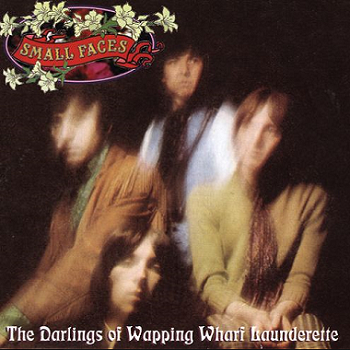 “I just want to say a couple of things” Al announces. “We sold more copies of The Small Faces compilation The Darlings of Wapping Wharf Launderette. We sold 400 copies of that double CD compilation. We sold more in Seattle than any English record store. That compilation sold like Nirvana’s ‘Nevermind’. It was over a period of years, but that was incredible. It’s because there were three or four bands in Seattle that covered The Small Faces. The Small Faces are extremely popular in Seattle and that’s very unusual in any city. It was mostly The Faces, but people who like The Small Faces are more specialists and this is an area (the northwest) where they apparently had a large fan base, It was part of the zeitgeist and it’s unbelievable. When you talk about The Faces ‘ehhhhh’ but when you talk about The Small Faces. ‘Brilliant! Genius!’
“I just want to say a couple of things” Al announces. “We sold more copies of The Small Faces compilation The Darlings of Wapping Wharf Launderette. We sold 400 copies of that double CD compilation. We sold more in Seattle than any English record store. That compilation sold like Nirvana’s ‘Nevermind’. It was over a period of years, but that was incredible. It’s because there were three or four bands in Seattle that covered The Small Faces. The Small Faces are extremely popular in Seattle and that’s very unusual in any city. It was mostly The Faces, but people who like The Small Faces are more specialists and this is an area (the northwest) where they apparently had a large fan base, It was part of the zeitgeist and it’s unbelievable. When you talk about The Faces ‘ehhhhh’ but when you talk about The Small Faces. ‘Brilliant! Genius!’
.”Moshe talked to Steve Marriott once” Al says.
“Yeah, I talked to Marriott” Moshe says, adding “it was terrible. He was at the end of his life. He was really wasted”There’s a slight pause here because I know how big fans Al and I are of The Small Faces. I assume Moshe is as well. It’s a bit unsettling thinking about his demise.
We move back to Al and Moshe’s story;
“People like Peter Buck would shop at the last store. We had a Garage and Psychedelic section that was all like Sundazed (a great reissue imprint) and other related labels. That stuff would fly out of there, because nobody had a garage/psych section. Maybe Satellite Records did”.
“Oh, they weren’t around then” Moshe reminds us.
“I know” Al says. But they were the only ones that would have anything comparable. They wound up in a whole different place. I don’t even want to talk about Scott. I actually got to know him later. He was really cool, He burned me a Tony Joe White box that I really treasure”
“We had the largest James Brown section that I’ve ever seen. We had every James Brown we could order. We’d order 36 of them at a time. We had 80 Johnny Cash albums at one time. That’s what made the store different.”
“What was that MTV show? The Real World? Al asks. “They came and filmed in our store. They filmed in our store because they heard we had all these James Brown records and a lot of other great records. They came and shot and they said if they wanted to use it they’d let us know, but they didn’t. They promised us they’d send us the video but they never did. So “Fuck You Real World! Fuck You MTV! I Hate My MTV!
I tell them occasionally late at night I will watch a bit of I Want My ‘80s
“I HATE THE 80s!” Al tells me abruptly. “I love The Jesus and Mary Chain. I love Echo and The Bunnymen and I love specific groups. But people used to come in the store-and this is where I used to get riled up- people would come in the store and ask ‘Where’s your 80s section?’ and I’d say ‘We file by category and music by genre’.
“That was the thing” says Moshe. “The way Al is talking now. Sometimes that could put people off”.
“But some people were down with that” says Al. “I had a conversation with somebody the other day; that people have to pick one album by an artist that precludes the rest of the artists’ output. There are certain artists like The Kinks or Pink Floyd or The Beach Boys or Lou Reed or whoever…artists who’ve made multiple great albums, and you don’t have to pick one album. It’s so lazy-minded…like ‘what’s their greatest album?‘ Top 10 lists. Top 40 lists. Bullshit!
“But” says Moshe “Other record stores would tolerate opinions and…”
“But should the come to the store to buy one record?” Al counters.
Moshe responds by saying “Well if they’re giving me money to buy that one record…”
“But I sold a lot of those ‘one records‘ Al says. “Obviously if it was Love it would be Forever Changes, but that doesn’t negate Love’s self titled album and and Da Capo and Four Sail. We had that conversation”
“Well one time we had a customer come in and say Love Lost is my favorite Love album” Moshe looks at Al “and you’re response was
“Well I’ve heard that cliche before” and I was like ‘Al why are you…”
Al tells me “Moshe’s absolutely right about that. I disagree with it philosophically, but he’s right because there’s no point because favorites are legitimate…
“Moshe looks at Al and says “But this was a guy that has similar tastes in music as you”
“No, no you’re right because favorite is legitimate” Al repeats. “Best is not legitimate. I go off on people on facebook all day when they say“best”. I just had a thing on a facebook thread about T.Rex. Some critics there are are lovely and very nice to me and I like the guys and everything. I respect them. But this guy didn’t really have any reason to be hostile…he said ‘T.Rex didn’t make any good records after ‘Tanx’…and I said ‘I’m sorry…records YOU didn’t like after ‘Tanx’ didn’t mean they didn’t make any other good records’. That’s the distinction I make between the subjective and the objective. I could go on and on and on; I’m verbose…”
“That’s part of my ethos” says Al.“I bought those albums when they came out. I was one of the three people in America that actually bought The Velvet Underground. I actually went back to The Velvet Underground and started with ‘Loaded’ but I always bought The Small Faces when they came out; The Kinks-I bought them all when they came out. I bought Pink Floyd when they came out. We had all these people at the shop that would buy all these records and they’d keep coming back to the store and they wanted the next record…they basically wanted something else. They wanted ‘The Kinks Are the Village Green Preservation Society’ and then they wanted ‘Arthur’.
Moshe turns to me and says “This is what the store was like. Al would be like an Al Milman Stage and Word Show”.
“I’m not involved in music except listening to it” Moshe says “Once the store closed…I’m not really a musician so there’s no avenue.
“Well you’re a collector” Al tells him.
“I wouldn’t define myself as a collector” Moshe responds “because to me a collector is an obsessive person. I’m a buyer of records”.
“Eventually we’ll call you an obsessive person with a lot of records. It’s all the same.” Al tells Moshe.
“None of my kids understand” Moshe says. “I have four kids now but they don’t understand the mentality; but there are people, and you always know who they are, who are collectors, but I’m not a collector.”
“Oh no no no” Al says as he laughs “You’re not ready for a psychiatrist, but you’re an avid fan and you are a collector on some level.”
I admit to them I have a distaste for the collectors market after spending so much time around indie artists and financing indie artists’ projects…and having run three independent record labels. I tell him I’m always disappointed to see collectors make more money off the sale of one record than the band ever made off an entire run of a thousand records. Of course this is kind of a dumb thing to say to someone who has made a living off selling collectible records.
“I don’t mind the collectors market on some level” Al tells me. “I don’t necessarily have a problem if they make money selling it if they like the music. If they don’t have any interest in the music, that’s when I take offense. But I can’t begrudge if they like it, and they’re actual, genuine fans that bought it when it came out and sell it for market value later. I can’t begrudge them at all because if they sell it cheaply the guy they’re selling it to is going to turn around and sell it for $200. If they just buy it and they don’t have any respect for what it is, that’s another story”.
“It’s just supply and demand. In other words, if you don’t like indicting the whole of capitalism- and capitalism has its drawbacks-but it’s all one whole, and we’re all within that system. So I’m not going to hold it against just one guy. I’m not going to point the finger at one guy because he’s not going to sell it cheap, and get ripped off by some other guy who’s playing for himself. I grew up in New York. We’re wary of things like that. I hope the guys got a good game. If he couldn’t sell it for that price and they try to talk him down so they can do to sell it at a good price. “I’m not going to fall for that. I don’t fall for any scam”
I tell Al I know artists who have re-pressed their own records if they become valuable much later after their first release. They make them look just like the originals and sell them on the collectors market. They only put out a few at a time so they don’t ruin the price. I tell him these are not bootleggers. These are artists who actually own the material.
“Actually it’s diabolical” he says. “I don’t respect it, but these are not stupid people. I’ll tell you what. If they’re getting luxuries from it than I think it’s scummy. If they’re surviving and eating and paying rent from it I think it’s alright. If they’re surviving from it that’s OK.”
“You know what Yoko Ono said about the Beatles and the John Lennon records? She doesn’t care about bootlegs if people are just paying their rent from it. If they’re making millions she’s going to go after them, but she doesn’t go after the small guys that are just eating and paying their rent from it. Paul McCartney does…well he did at one time. I read a story that he allegedly went to a stake-out of a bootlegger and hung out in a surveillance truck. It was in Japan and that’s crazy-obsessive. He seems like a nice guy but that’s nuts.”
Al tells me “We’d like a chapter of your Northwest book if you’re game for that. We know Gillian Gaar and Clark Humphrey. They have great books.”
I don’t have the heart to tell them that I am, in fact, writing a book…but it’s a completely different subject than music. Then I tell them that recently I saw something about the 20th Anniversary Edition ‘Loser’ the excellent chronicle of the Seattle music scene written by Clark Humphrey. In the ad the cover of the book’s new edition is shown and beside it copy announcing the release of ‘Loser’ by “Clark Humphries”
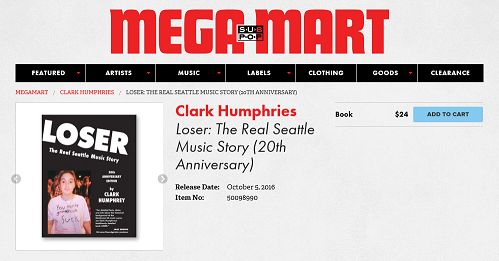 “Unbelievable!” I tell Al and he agrees. Clark’s proper name is clearly spelled on the book’s cover in the ad but no one took the time to look at the cover, then the ad copy and back to the cover a few times, and try to figure it out. A misspelling of the authors name, when the cover of the book clearly shows the authors name? Anyway, I pray Clark never saw it. He’s a really good guy and might let it go…but on the other hand if it was me…but then, it is kind of funny knowing what a huge mistake was made.
“Unbelievable!” I tell Al and he agrees. Clark’s proper name is clearly spelled on the book’s cover in the ad but no one took the time to look at the cover, then the ad copy and back to the cover a few times, and try to figure it out. A misspelling of the authors name, when the cover of the book clearly shows the authors name? Anyway, I pray Clark never saw it. He’s a really good guy and might let it go…but on the other hand if it was me…but then, it is kind of funny knowing what a huge mistake was made.
“My friend had a power pop group in New York called Radio City” Al tells me “They were included in a Power-Pop book and the authors got all the information wrong. In fact I helped them correct it. One of our friends would have been very insulted; that guy was omitted. I made sure he got reinstated. The other main guy in the group got reinstated too. They (music writers) do this all the time”.
“I’ll tell you what. If you have a chance to proofread when people are doing these things and they don’t proofread than it’s your own fault”.
I have to agree, but somewhat sheepishly, because I’m not able to rely on a proofreader and I make plenty of mistakes that I ask my readers to point out. I’m not above mistakes.
“I proofread a Zappa book with a guy I’m not talking to anymore” says Al “It was translated from French, but because I was friends with Zappa I did it as a favor. We proofed for accuracy. We corrected all the mistakes.”
We begin to wrap things up. All of us have more things to do.
“I just wanted to make sure I didn’t talk over any of Moshe’s stuff” Al tells me. “I don’t even know I’m doing that half the time. It’s not like it’s a malicious thing.”
Moshe admits “There were some conflicts with us at the store, but we’ve cleared it up. No one can put up with Al for more than ten minutes!”
“It was a miracle” according to Al. “There’s two different kinds of people. With some people it’s unconditional. I think our friendship is pretty unconditional, but I understand what you’re talking about. With some people it doesn’t rub, but with some people it does rub. I want so say most of the people I know that have had record stores together busted up and wanted to kill each other and I’m not going to mention any names. Moshe knows exactly who I’m talking about.”
“But I did want to chill out at some point” Moshe says. “It wasn’t necessarily before the store busted up. It was a long time before that.”
“I understand that” Al says to Moshe “Usually in a record store there’s one guy like me and one guy like you. It’s not abnormal. And most of these guys never speak to each other again. I think it’s really attributed to dishonesty more than anything else. We never had a dishonesty issue.”
“No” Moshe replies.
Al tells me “I’ve worked with people that run the gamut. People that had your job and people that were very technical. Music is at its freshest no matter how you do that whether it’s primitive or really technical.”
Al stops for a moment and says “I just want to mention people who worked for us before I forget about it. Robert Roth, Matt Sullivan from Atlantic Records and Brandon Pitts, a very good friend of ours. Another personal friend of ours, Adam Bratman. Todd Kluger and Rob Gardner. No offense guys, I don’t remember everybody. I remember a guy named Eric and Gabe and Tom Brady-we have to mention him-not the asshole football player…that guy’s really an asshole, but I don’t have to tell you guys. I’m not a football fan but I can’t stand his politics.
We finish. Al’s parting words of wisdom? “We don’t look for trouble. It finds us.”
The new Alan Milman Sect record will be out at the end of this year. The Alan Milman with Evan Foster of The Boss Martians will be appearing at Darrell’s Tavern in Shoreline on August 25th. The Alan Milman Sect hasn’t done a show in 20 years so this is a golden opportunity!
Darrell’s Tavern is at 18041 Aurora Ave. North, Seattle, WA, 98133. If you get lost on your way there, call (206) 542-6688. Maybe they’ll answer. Maybe you’ll get a recording of upcoming shows!
-Dennis R. White. Sources; Al Milman and Moshe Weinberg (interview with the author); Jonny Zchivago ” The Alan Milman Sect-Stitches (1977-1988) Bedazzled BCD007″ (DIE OR DIY, April 18, 2014); Fallout Records (www.falloutrecords.com, retirieved July 6, 2018); Cynthia Rose “Legend Of Fallout Records, Books & Comics Evolves As Energetic New Owner Takes Over Capitol Hill Store” (The Seattle Times, August 27, 1999); Kory Grow ” Broken Records: The Final Days of Bleecker Bob’s Golden Oldies” (Spin Magazine, April 24, 2013); Nicole Brodeur “John Keister’s last stand: ‘Almost Live!’ Star Straddles Old and New Seattle” (The Seattle Times, August 25, 2017); Sarah Ravits ” Meet The Man Who Discovered All Your Favorite ’90s Music” (UPROXX, 1October 15, 2015); Zach “Remembering One of Seattle’s Greats on the Eve Of Record Store Day: Fallout Records 1984-2003” 107.7 The End, April 15, 2016); Sean Nelson “Seattle Music Vets Gathered to Revisit Hype! 20 Years Later and It Was Kind of Intense” (The Stranger, September 27, 2017); Michael Canter ” Bleecker Bob’s & The Demise Of The Independent Record Store” (The JiveWired Journal, October 15, 2012); Ira Robbins “The Alan Milman Sect” (Trouser Press, http://www.trouserpress.com/entry.php?a=alan_milman_sect retrieved July 6, 2018); The Alan Milman Sect-Punk Rock Christmas EP” (Old, Weak, But Always A Wanker-The Punk Years, April 21, 2017-retrived July 5, 2018); Rachel Belle”Legendary Seattle DJ Marco Collins is the Subject of the new SIFF film ‘The Glamour and The Squalor” (MyNorthwest.com, January 25,2018); “The Trojan Records Story” (www.trojanrecords.com/the-trojan-records-story-retriveved July 6, 2018); Tony Sokol “Rudeboy: The Story Of Trojan Records:Boogie on Reggae Women and Men, Rudeboy: The Story of Trojan Records breaks down ska beats” (Den of Geek, June 6, 2018); Steve Traiman “Bedazzled Discs Makes A Mark On Seattle Scene” (Billboard, Oct 10, 1998); Chris Morris “Abbey Road’s Inspiring Altruism” (Billboard, Apr 27, 1996).



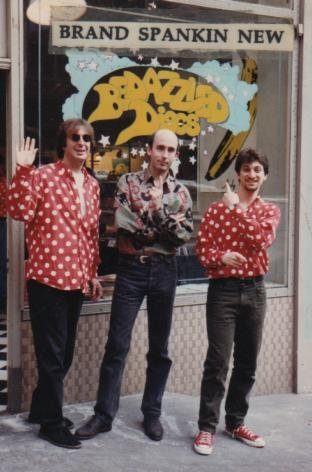
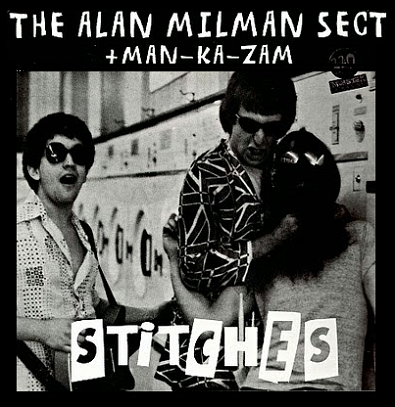
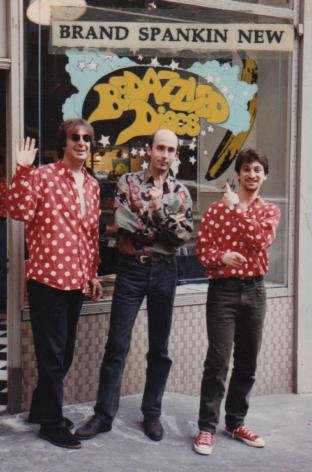
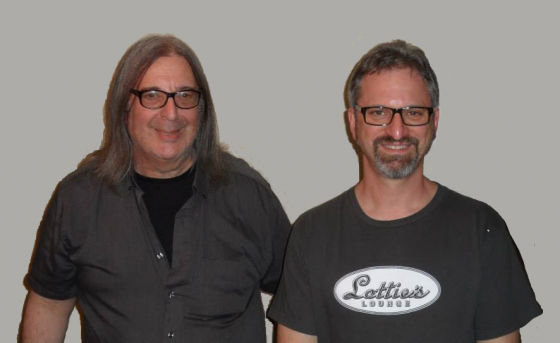
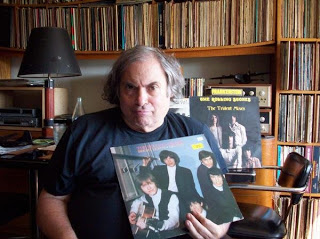
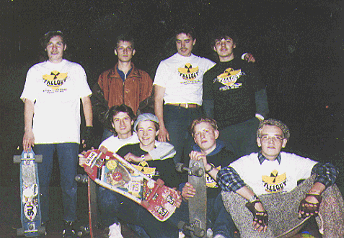
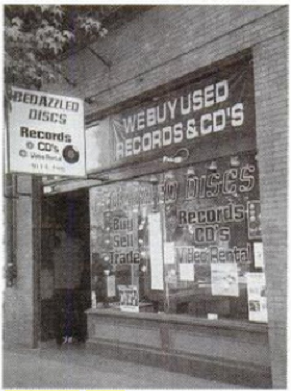
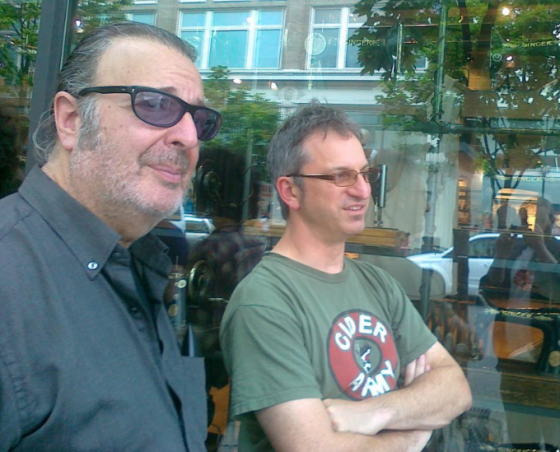
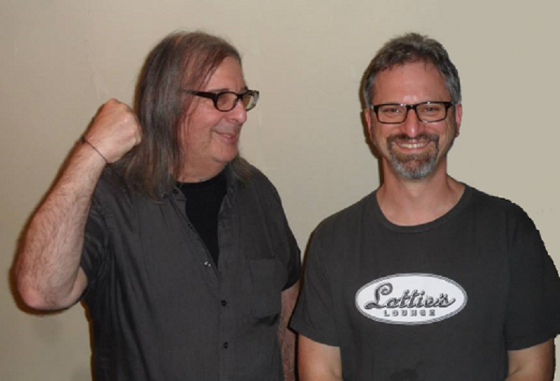
Since you asked, I’m pretty sure that Matt Sullivan isn’t at Atlantic Records but rather at Seattle’s Light In The Attic Records.
I don’t know where Matt was at the time. I only had Al and Moshe to rely on for this information. Perhaps I should have fact-checked it, but keep in mind the time period was several years ago.